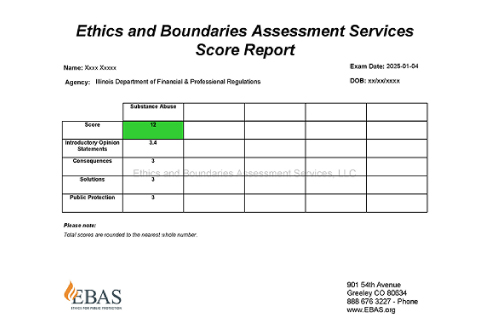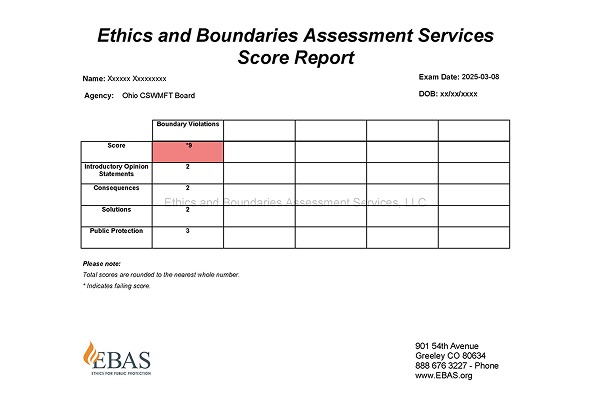The EBAS assessment shows how a licensee analyzes real-world ethical dilemmas. The EBAS assessment uses open-ended scenarios to reveal reasoning, judgment, and recognition of boundaries. This gives boards objective evidence to support confident, defensible decisions.
How to Read Results
The report provides results across five domains: Boundaries, Fraud, Professional Standards, Substance Abuse, and Unprofessional Conduct.
Each domain is evaluated through four sections that represent key aspects of ethical reasoning: Opinion, Consequences, Protection, and Solutions. Each section is scored on a scale from 0 to 4, resulting in a total domain score between 0 and 16.
A passing score requires a minimum of 12 points in each domain. Section scores highlight areas of strength and those needing improvement in ethical reasoning, as defined in the scoring rubric.
Further Reading
See the EBAS Sample Assessment & Rubric for definitions and scoring criteria.
What the Results Mean
A Passing Score
shows the licensee has sufficient ethical reasoning. It also sets an accountability baseline: if issues come up later, boards can treat them as willingness problems, not knowledge gaps.
A Not-Passing Score
highlights a knowledge gap and points to remediation and future reassessment.
Both outcomes create a defensible record for board judgment. Final decisions stay with the board
Sample Score Reports
Each report clearly shows whether the standard was met. Passing requires 12 total points (green highlight). Scores below 12 do not meet the standard (red highlight).

Passing Result

Does Not Meet Standard
Where Results Fit in the Disciplinary Process
Consent Agreement Use
Applied early in a case
- Identifies areas where remediation is needed
- Offers insight boards may use when shaping Consent Orders, Remediation Agreements, or Monitoring Agreements
- Guides targeted strategies for improvement
Board Order Use
Applied in licensure or reinstatement decisions
- Provides evidence boards may consider when deciding licensure or reinstatement
- Strengthens the record for future disciplinary action
- Supports risk management and defensible licensure outcomes
How EBAS Ensures Valid Results
EBAS delivers results boards can stand behind — consistent, valid, and reliable.
- Every exam is scored by multiple trained graders using a standardized rubric.
- Psychometric studies show that EBAS scores are both valid and consistent across five key domains: Boundaries, Fraud, Professional Standards, Substance Abuse, and Unprofessional Conduct.
- Factor analysis confirms that the structure of the EBAS aligns with its intended ethical compass framework.
Further Reading
See The Science Behind EBAS for details on independent validation and research.
Support
EBAS provides guidance to help boards interpret and apply results confidently. The team remains available to answer questions and share best practices for using results in remediation, consent orders, and licensure decisions.
Further Reading
See our Board Frequently Asked Questions for guidance on interpreting results and applying them in board processes.








